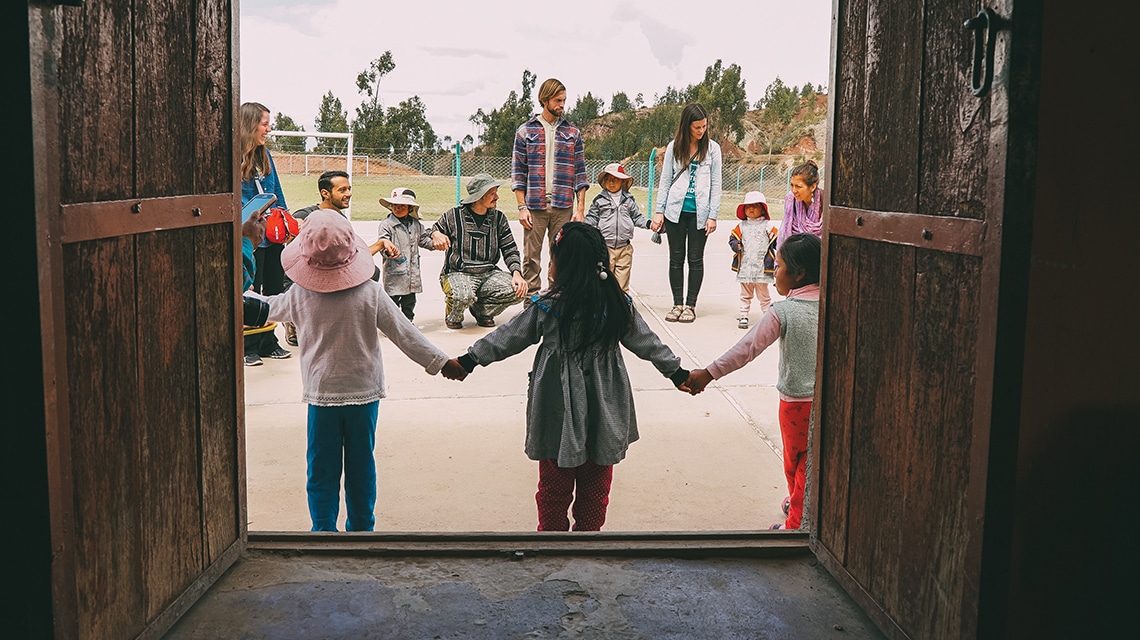By Gord Nickerson
When it comes to joining God in His global mission of making disciples who make disciples, instead of promoting the idea of cancelling your short-term mission trips, we should encourage church leaders to prayerfully and carefully plan and engage in more short-term mission trips and experiences that benefit everyone involved.
What can happen as a result of a mission trip that won’t necessarily happen through normal church activities?
- Bonds built between peers, team members, and leaders. You can grow closer on a two-week trip than during a whole year of church activities.
- Extended quality and quantity time to form relationships
- Opportunities to model Christian responses and lifestyle
- Trips encourage a serving mindset
- Develop a heart for those less fortunate
- Automatically takes team members out of their comfort zone
- Some lessons learned in a different culture can’t be learned at home
When are mission trips most effective?
Over the years, we have witnessed and experienced differences between mission trips that are considered to be effective and those that are not.
Let me highlight three easily overlooked practices that I believe can make a huge difference between effective and non-effective disciple-making trips:
- Effective disciple-making mission trips are saturated with prayer.
As a leader of a mission team or an individual participating in a short-term, cross-cultural mission, prayer needs to be an essential component. We see how prayer was a significant part of Christ’s life and that it needs to be central in all disciple-making.
When it comes to engaging in a mission trip, it is best that the experience is covered in prayer from long before anyone ever steps onto a plane, until long after they return back into their home culture. Specifically, it would be wise to listen and talk to God concerning the following:
- Where is God inviting us to go? There are so many needs and opportunities.
- Who is God asking us to partner with? What country, peoples group, mission organization?
- Who should be on the team?
- What should my role be on the team?
- What do our team and I have to offer those we serve?
- How best can we raise the resources needed for the trip?
- How can I build a support team around me?
- How can I best join God in what he is doing in the lives we are going to serve?
- Effective mission trips are intentional.
Intentionality in our spiritual lives and ministry sometimes proves to be a complicated concept. On one hand, intentionality can become so much about strategizing, planning, expectations, and agendas that we leave no room for the work of the Holy Spirit and the fulfilling of His purposes.
On the other hand, the lack of intentionality and purpose, “let’s just go with the flow,” can result in a mission trip looking more like a glorified, spiritualized vacation than being on mission.
Often, we find ourselves in a prison of two ideas. It seems like it’s one or the other. You are either living with intentionality or following the Holy Spirit’s lead. The truth is that it needs to be both. In the disciple-making life, it’s not either/or it’s both/and at the same time.
Relating this to cross-cultural mission trips means that as we pray and discern the Holy Spirit’s leading, we also take intentional steps to join Him on the mission. Just like the need for discerning prayer, there also needs to be intentional planning and execution. We would be wise to be intentional as we listen to the Spirit’s leading and join God in His mission.
Some good questions to ask are:
- What is the purpose of this mission trip?
- When the trip is over, what will have made it successful?
- How is this trip contributing to Christ’s commission of making disciples?
- Effective mission trips incorporate training, debriefing, and following up as essential components of the experience.
Training: I think we’d all agree that pre-trip training is an important aspect of any cross-cultural missions trip. To be trained in some basic cross-cultural competencies and skills that will be used during the trip is an important part of making any short-term mission a positive experience for all involved. Beginning the training of your team long before the trip takes place is key to a successful trip.
Debriefing: Leading team members in processing and debriefing their experience will help them discern what God has taught or is teaching them through it, enable them to communicate with others about their experience, and prepare them to re-enter their home culture well and with grace. Often, once a team member has returned home, they also return to the busyness of life, and within weeks have slipped back into the same routines and habits of pre-trip, forgetting those experiences and lessons that God taught them while away. Taking time to debrief before returning home can allow for healthy processing that can result in true transformation.
Following Up: Depending on team dynamics, most mission trips cultivate strong relationships between team members. Often, they share intense experiences, both positive and negative, that cause them to grow closer to God and each other. Once back home, regular check-ins and reminders of how they had seen God’s Spirit work in and through their lives during the trip will assist in cultivating continued growth.
Some helpful questions might be:
- What competencies and skills are important for individuals on the team to have?
- How can we best provide the training that is necessary pre-trip?
- When, where, and how will time be given for the team to debrief the experience together?
- What should follow-up of team members look like?
Finally, we believe and have witnessed that God can use well-planned and well-executed mission trips as a significant tool for transforming lives.
This information is courtesy of Sonlife, whose vision is to transform the culture of youth ministry in North America, restoring it to the disciple-making heart of Jesus, www.sonlife.com.






